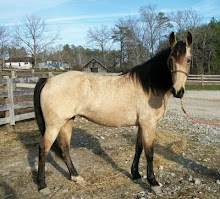I got caught in the middle of a Secretariat the movie argument yesterday. In one corner of the ring, a 60-something woman, smart, works in the office of a horse farm. In the other corner of the ring, a 70-something, vibrant UK faculty member in the arts who bets on horse races in every state of the union, knows more about jockeys, specific horses and tracks than I ever will.
The woman (let's call her Lil) loved the Secretariat movie for how it portrayed Penny Chenery and her courage to stand up in the man's world of racing and do what needed to be done for Secretariat to have a chance.
The man (let's call him Stan) refuses to go see the movie because he says that Secretariat was the greatest horse that ever was, and this movie (from what he's read) is more about Penny C. than about the horse. And furthermore, it got some facts wrong. And if that wasn't enough, it was made by Disney for god's sake and you know what Disney will do to animal movies.
Lil and Stan sparred back and forth. Lil held her ground, saying it sounded like Stan was chauvinist and just didn't like the fact that the story had a strong woman in it. Stan shot back that Penny didn't really make all those decisions - like about the syndication of Secretariat - that it was Seth Hancock and other major horse farm owners (men), and she just went along. And furthermore that she was the daughter of one of the richest farm family in Virginia, so enough of this "poor little Penny" stuff.
Lil kept going, not willing to give an inch, especially to a man who had not even seen the movie. Stan said, that's right and I WON'T see any horse movie made by Disney.
To which Lil replied, well I won't go to the races and bet because these horse owners have an addiction to breeding horses and they turn out all these animals that don't make it big on the track, then discard them.
It occurred to me that Lil represents as close as we get to what the general public perceives of the racing industry. Even though she works on a horse farm, she is not "into" the business, does not have hands on experience in the barns or tracks, and is perfectly happy to watch a movie by Disney about a great horse, because she loves the story that surrounds that horse as much as the story of the horse itself.
The big question out of this argument between the "general public" and someone who is immersed in the betting part of racing, and therefore knows his facts and cares mostly about how THE HORSE was portrayed, that they got the facts right -- Is: "Are movies like Secretariat good for racing?"
What if Secretariat the movie DID get the facts wrong on who did what? What if there is more screen time focusing on the people and not much on the horse? What if the main player is from the well-heeled Virginia horse crowd which reinforces the public's image that all horse owners are rich? What if the movie is produced by Disney, which is famous for the personification of animals, which has contributed to the public's unrealistic view of how livestock is treated, how much time and effort goes into caring for them, and the false impression that animals have the same type of feelings as humans do?
My opinion is YES, let's support these types of movies. The success of the movie shows once again that the public has a love affair with horses, even though they may contain a somewhat unrealistic view about how the animals think and act. Is it important to the industry whether or not Penny Chenery did a particular thing, or had a particular idea? These are movies, not documentaries. If you want facts true down to the detail, go watch the History Channel.
We need the images of horses, of all shapes and sizes, and all jobs and sports, in front of the public. And we don't need just the famous stars, we need the backyard horse stories too. This is good for ALL of the horse owners in this country. American is beginning to forget how horses have impacted our history and our lives. We need it all, and if it has to be Disney that does it successfully, we just do our best to make the story show the realism of horses, good and bad.
Sunday, January 23, 2011
Subscribe to:
Comments (Atom)
